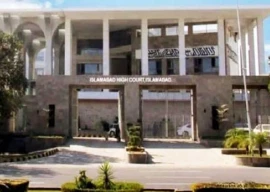
In this period, three assistant commissioners heading the Tribunal were changed. Each visit to the Tribunal, set up at the Assistant Commissioner’s (AC) Office, would cost Bheel Rs300 that included paying for a rented motorcycle, fuel and food. Sometimes the AC would not show up; at other times, his case may be taken up as the last item, even though he would be required to be at the premises at 8.30am.
Judicial affairs: ATCs asked to clear backlog
The case demanded at least two visits a month. In all, he spent some Rs4,800 on transport alone. Eventually, the case was decided in his favour and the landlord made partial cash payment before the AC, issuing a cheque for the remainder. When Bheel went to clear the cheque from the bank, it was declared invalid. Several calls and a visit to Leghari resulted in insults and a stern warning to not return again. For a case he apparently won, Bheel wasted seven months of efforts to receive nothing.
Four years ago, Sabahat Bibi*, living in an industrial area of Karachi, found herself confronted by the biggest nightmare of her life when her six-year-old daughter, who had gone out to play, was brought home, bleeding and screaming, by a neighbour who said she had a fall. It took the parents many minutes to figure out she has been raped. The episode marked the beginning of a four-year-long ordeal starting from a run to the police that asked them to go to one of Karachi’s three hospitals authorised to conduct medico-legal examination, two months long treatment of the traumatised child in several hospitals, and follow up of the case in the court through a lawyer who charged Rs11,000 and never showed up.
The distressed family was assisted by the NGO War Against Rape (WAR), that offered free legal services, ensuring the perpetrator was brought to justice. However, despite WAR’s help, Bibi ended up spending over Rs150,000 in various expenses, dealing with the events that unfolded following the rape and filing of the case in the court.
The above mentioned real life accounts are adequately put into perspective by various in-depth studies and reviews detailing the expensive course of justice for Pakistan’s low income background litigants. Pakistan’s slow justice system, as till December 2014, 14,713,57 cases were pending at the district judiciary, which is where majority of the cases are dealt, punishes those who become involved in civil or criminal litigation. Cases can go on for decades. Cost in terms of money spent ends up going beyond the claims made.
Rising miscellaneous expenses
A regular litigation may involve court fee, lawyer’s fee and other miscellaneous expenses. Court fee is subsidised and depends upon the nature of the case. Lawyer’s/law firm’s fee may start from Rs20,000 and has no upper limit. There are also no boundaries for the miscellaneous expenses that broadly incorporate transport cost, additional paper work, expenses incurred on gathering evidence and even paying to the court reader to extend the date of hearing.
When a complainant seeks lawyer’s services, the fee quoted is neither negotiable nor follows the conditional model practiced in several countries, that is the fee is only payable if there is a favourable result.
Even the wakalatnama (power of attorney) is a ready made document with no room for negotiating the terms of reference. Apart from the court fee payable in civil claims, there is an additional expense for necessary paper work, which may cost thousands of rupees and is often referred to as ‘miscellaneous expense’. No receipts are shared by lawyers or their munshis (assistants). While such expenses may be up to Rs10,000, the client may be charged many times more. If the case drags on, additional charges keep piling up. If a client suspects lawyer of a foul play, there is a provision for filing for a disciplinary action with the concerned bar council. But lawyers are seldom held accountable by the councils.
Justice served: Man gets life sentence for double murder
Fortunately, there are free legal aid services, specifically covering human rights violations cases and others. Some well-known law firms also take up cases on pro-bono basis. There is no research on the impact of free legal assistance, but these, if done with competence and professional honesty, may provide immense relief to the litigants.
Whether one is receiving free legal service or engaging a professional, an important part of the overall cost is the so-called miscellaneous expenses that are seldom debated. Being directly and indirectly related to the case, these mark the biggest dent on the pocket of the complainant, more particularly those from the low income background. However, no solution has ever been identified to address this problem area.
Consider the expenses Bibi had to pay as she sought justice for the rape of her daughter. Her carpenter husband brought home an income of Rs3,000 a week, while she stayed as a housewife taking care of their four children. After their daughter’s rape, the couple rushed to the police to file a case, who advised them to seek a medico-legal certificate. They told Bibi they had no fuel in their vehicle so the couple will have to arrange for transport themselves. At the hospital, the child had to be admitted because of the physical and mental trauma inflicted on her.
Bibi shares her daughter would stay in the hospital, sometimes for several weeks, as she kept developing a series of ailments following the brutal rape. An average bus fare of Rs50 per person per trip, conservatively, cost the couple Rs200 per day for all the days the daughter was in the hospital. Expenditure on medicines and tests were in addition to that. For the four years of trial in the court, there were at least two trips to the court every month, demanding an additional amount of Rs500 per day for travel and food expenses. As the news of the daughter’s rape spread, Bibi’s family was forced by the landlord to vacate the rented house as he did not want any police visits or other controversies at his premises. For the entire period, the family moved house every six months, as no landlord would let them stay. This was in addition to threats received by the family from the rapist and his relatives, who would keep visiting their house and children’s schools.
Today, they pay Rs5,000 for a small room in Karachi, as Bibi works as a domestic helper in several houses and raises an income of Rs7,000 a month. Though the culprit has been punished, and the sense of insecurity has subsided, Bibi has to work in low-paid jobs as she wants to stay in the vicinity of her area to be able to personally pick and drop her daughter from school and tuition, ensuring she is in safe hands. She says despite the free legal aid made possible by WAR, she had spent over Rs150,000 from her own pocket to deal with the events, following the rape.
Traveling for justice
Matters are equally distressing for those living in rural areas, engaged in litigation in High Courts or District and Sessions courts. Depending upon the distance to the concerned district’s courts, the travel cost may entail anything from Rs300 to Rs1,000 or even Rs2,000 per trip. Not being fully aware of the complicated case procedures, litigants find themselves being turned away if the relevant court staff, including the judge, is absent, wasting the particular trip.
At the court premises, munshis fleece poor complainants charging five times to acquire copies of orders and other notifications. Even those seeking settlements from Tenancy Tribunals struggle for claims as small as Rs10,000. The hearings go on for at least a year. Lawyer’s fee – which may start from Rs20,000, in addition to paper work and transport to the lawyer – is part of the package that also entails innumerable visit to the AC’s office, where these applications are pursued. With the power equation tipped against victims such as Bheel, as most ACs themselves come from a landlord background, the course of justice remains an elusive proposition.
Acting IHC CJ: Justice Noorul Haq Qureshi takes oath
Family courts present a similar picture. Apart from lawyer’s fee and other court expenses, a strong case demands a number of documentary evidences, which may include certificates, receipts, witnesses’ testimonials; all processes that incur substantial expenditures. In a study, The Impact of Family Laws on the Rights of Divorced Women in Pakistan by the National Commission on the Status of Women, women interviewed summed up the bitter experience of family courts: “I spent all my savings of about 10lakhs in securing the custody of my children. Now I am penniless and have no support to go further,” and “the expenses for litigation were far more than my dower amount.”
It is perhaps these factors that discourage people from turning to litigation to access justice. When they can, out-of-court settlements and informal mechanisms, including jirgas, are preferred over litigation.
The discourse on judicial reforms emphasises speedy trials as a major solution contributing towards cutting of cost, both of time and money, associated with litigation. The judiciary, in recent times, has been seriously working on clearing backlogs and upgrading systems for efficiency. These are useful measures. However, the issue of steep cost of litigation may only be addressed if reforms focus on lawyers fee (which may also include setting an upper limit, an accountability and monitoring system for their performance and issuance/renewal of license), means to prevent litigants from wasting resources on commute and unnecessary paper work, subsidies to engage competent lawyers through a well-devised institutional process and for other essential expenses. Primarily, strengthening arbitration and alternate dispute resolution mechanisms is important so that expensive litigation is not the only option for the poor and the destitute to access justice.
*Name has been changed to protect privacy
Zeenia Shaukat is an independent professional. She works on rights-based research, advocacy, capacity building and media communications primarily on issues related to human rights, development, and social justice.













































COMMENTS
Comments are moderated and generally will be posted if they are on-topic and not abusive.
For more information, please see our Comments FAQ